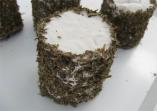 It is possible to leave a nutrition conference freaked out about the state of the world, and in dire need of a good remineralizing kelp treatment. But ditto an environmental (literature) conference or just about any other kind of conference nowadays I suppose. Still, we must make the best of where we are, so a nutrition conference is a good place to take in ideas about both cautions and actions to get our bodies through. (And to get a kelp treatment if that will help you in the meantime.)
It is possible to leave a nutrition conference freaked out about the state of the world, and in dire need of a good remineralizing kelp treatment. But ditto an environmental (literature) conference or just about any other kind of conference nowadays I suppose. Still, we must make the best of where we are, so a nutrition conference is a good place to take in ideas about both cautions and actions to get our bodies through. (And to get a kelp treatment if that will help you in the meantime.)
Chris Kresser has evoked much hand-wringing and teeth-gnashing in his cogently-argued dissection of the acid-alkaline theory, which has been the foundation of much nutritional training over recent decades. The theory holds that: (1) the foods we eat leave behind an ‘ash’ after they are metabolized, and this ash can be acid or alkaline; (2) we should eat more alkaline foods than acid foods, so that we end up with an overall alkaline load on our body, making us less vulnerable to conditions such as cancer and osteoporosis; and (3) that the pH of our blood can be determined by testing pH strips in our saliva or urine.
It is worth noting that although there is little agreement on which foods are acid and which alkaline (a red flag there?) the alkaline lists tend to heavy on fruits and vegetables, while acid foods include animal products, so the theory is a particular favourite with those who advocate vegetarian or vegan diets. And those would emphatically not be people attending a Weston A. Price conference (poles apart: see the veg view vs the WAPF view).
Kresser allows that foods do metabolize into ash, but dismisses the idea that what we eat affects our blood pH (except in metabolic disorders such as ketoacidosis, aka DKA, not to be confused with ketosis). And although the pH of saliva and urine may indeed be altered by diet, their pH has nothing to do with blood pH, which is regulated by the kidneys. He suggests that health improvements may follow any improvement in diet (and it’s pretty easy to work out what those are – fresh, whole foods vs refined carbs) rather than being caused by acidity or alkalinity of what’s been consumed.
For the full explanation, I recommend reading Kresser’s two-part article on the subject. He was, inevitably, asked why – if it is so obviously flawed – the theory is still taught and promoted, and he replied that it takes time for science to nudge belief into change. And not least when there are vested interests at work. He quoted Upton Sinclair: “It is difficult to get a man to understand something, when his salary depends on his not understanding it.”
Speaking of (former) vegans, Lierre Keith (The Vegetarian Myth) revealed that her talk last weekend was the first she’d done that had not inspired pre-event death threats. She was there to make an impassioned plea for environmental responsibility, a cause that should straddle, but instead divides, vegetarian from omnivore. She described human agriculture as the “death of the living world” – its destruction of ecosystems and soil fertility, the biological corners cut to improve financial returns on large scale production, and the misuse of farmland to grow crops for factory farming or fuel.
When you buy a soyburger, she observed, “you’re actually giving money to the people causing the problem.” In the Weston A Price way, she referred to the health of traditional peoples as proof of the damage we’ve done to modern bodies: how European explorers noticed the good health of the populations they encountered, and how poor health inevitably follows modernization of our diets. “Cancer, like insanity, spreads with civilization” (Stanislas Tanchou)
Mark Schauss gave a couple of interesting talks. His research into nutrition and cognitive decline was comprehensive and detailed. One of his big messages was on the consistency he sees in research findings about the role of the two most heavily consumed excitotoxins (MSG and aspartame) in plaque development in Alzheimer’s. Both of these are hard to avoid if you eat processed or packaged foods, since manufacturers play shell games with the naming. For MSG, see the comprehensive list from Truth In Labeling. For Aspartame, beware NutraSweet of course, as well as its new name, AminoSweet.
He repeated an idea I’ve yet to see proven, that artificial sweeteners cause an insulin response similar to ingesting sugars, and lead as surely to insulin resistance and type 2 diabetes. While I think there are lots of good reasons to stay away from artificial sweeteners, I await compelling evidence for this one.
Few could argue with his main message though: the more artificial the diet, the worse the gut, and a bad gut means poor communication along the gut-brain axis. Which means poor cognitive function. And of course, daily exercise is the first best thing you can do to keep your mind fit and healthy.








